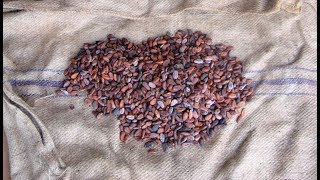(单词翻译:单击)
听力文本
Hari Sreenivasan: Today is Easter, and as is the case for many holidays, Americans often celebrate with chocolate. American demand is high. More chocolate is sold here than in any other country in the world. And there are millions of cocoa growers providing the supply, the majority of whom come from just two countries in west africa: Ivory Coast and Ghana. A new book, "Cocoa," looks at the difficult lives of those growers and their role in the cocoa industry. It was written by Kristy Leissle, who is on the faculty at the university of washington, and is currently based in Accra, Ghana. She recently spoke with newshour weekend's Megan Thompson.
Megan Thompson: Who are these cocoa bean growers? What conditions do they live in?
Kristy Leissle: Yeah, they're all-- 90%, 95% are small holder farmers, which means they own very little, small plots of land, and they grow a tiny fraction, each of them, of the total crop, which is over four million metric tons. So, each one of those cocoa farmers grows just a little bit of that. They live in really challenging conditions. The infrastructure that we enjoy here is not present in the areas where cocoa farmers live. So things like paved roads and running water and electricity, usually they don't enjoy those things. So it's a very challenging life.
Megan Thompson: What kind of income are these growers earning?
Kristy Leissle: It's hard to give you an average because there's such a range in how much farmers can grow. Some of the work that I've done has found between $2 and $3 a day, if you average it over time. It's also a little bit misleading to say $2 or $3 a day, because each cocoa farming household has a number of people who live in it, and so that income has to really be shared amongst them.

Megan Thompson: So, the value of the cocoa beans that these growers produce is estimated to be around $8 billion a year. But the value of the chocolate that those beans are used to make is estimated to be around $100 billion a year. Can you just talk about that market?
Kristy Leissle: You know, as you said, there's five million cocoa growers in the world, each one of them capturing such a tiny share of value of the crop that they grow. That means that they just don't have a lot of power, they have very little influence in this industry. Even collectively, it's been really hard for farmers to come together and organize, and exert themselves as a political force. They're far too spread out in remote, rural regions, and it's hard for them to come together in any way, exert themselves meaningfully.
Megan Thompson: You write in the book about this emotional relationship that we have with chocolate, and how that might kind of obscure the story behind it.
Kristy Leissle: I do think we have such an emotional relationship with chocolate, and that was something that we really invented. And it was the marketing and advertising of the early industrial chocolate bar and candies that gave us that relationship with chocolate. We associate it now with romance, and love, and holidays and celebrations. Chocolate is an everyday luxury, and, you know, here in north america, in europe, increasingly in Asia, we can buy a chocolate bar with very little impact on our disposable income. It's a very affordable luxury.
Megan Thompson: You talk about buying chocolate. I know when I walk into a store, I sometimes see chocolate that's labeled "fair trade," or "direct trade." I know some of the big chocolate companies have programs that they tout, supporting farmers and, you know, helping with sustainability. I mean, how much do we know about how much of an impact all of these programs have, and, I mean, what would you advise a consumer to do?
Kristy Leissle: When you are using a label like fair trade, there is a third party, not the cocoa farmer, not the chocolate maker, who says, these are the rules to play by, this is what is just, and you can verify that what is happening is what we say is happening. When a chocolate company adopts its own internal certification program, it is a lot harder to verify what they are doing, and so we have seen that shift in the industry. What I do say to people is, we are at a stage where we know so little about where chocolate comes from, so learn as much as you can, inform yourself, ask the companies that you buy chocolate from, ask the retailers to tell you where that cocoa came from.
Megan Thompson: All right, Kristy Leissle, thank you so much for being here.
Kristy Leissle: Thank you so much for having me.
重点解析
1.come from 来自
He's just come from the countryside.
他刚从乡下来。
2.spoke with 讲话
He spoke with great passion.
他发表了热情洋溢的讲话。
3.live in 生活在
I just live in hope that one day she'll talk to me
我只是妄想着有一天她会和我说话。
4.estimated to 估计
The loss is estimated to reach upwards of 30000 yuan.
据估计损失达30000元以上。
5.be used to 被用于
This piece of cloth can be used to make a pair of pillow cases.
这块布可以做一对枕套。
参考译文
哈里·斯瑞尼瓦桑:今天是复活节,节假日里,美国人喜欢用巧克力装点节日气氛。美国人对巧克力的需求量很大。这里卖的巧克力比世界上任何其他国家都多。供给这些需求的可可种植者达数百万之多,其中大部分来自西非的两个国家:科特迪瓦和加纳。一本名为《可可》的新书将着眼点放在这些种植者的艰辛生活以及其在可可产业中发挥得作用。本书作者为华盛顿大学教职人员克里斯蒂·雷斯利,目前居住在阿克拉,加纳。近期,她接受了周末记者梅甘·汤普森的采访。
梅甘·汤普森:这些可可豆的种植者是谁?他们的生活环境如何?
里斯蒂·雷斯利:是的,他们都是,90%,95%是小农场主,这意味着他们拥有的土地量很少,他们的种植量很小,每个人,总产量为四百多万公吨。所以,每一位可可种植者的种植量都非常有限。他们的生活环境十分艰苦。我们在这里享受的基础设施,在可可农民居住的地区根本没有。所以像柏油马路、自来水和电力照明这样的东西,他们通常不喜欢。他们生活的环境十分艰苦。
梅甘·汤普森:这些种植者的收入如何?
里斯蒂·雷斯利:很难给你一个平均值,因为农民的种植量差别巨大。我所做的研究发现,平均每天约可挣到2到3美元,如果你平均来看。说每天2美元或3美元也有点误导,因为每一个可可农家庭人数众多,所以收入必须真正分到每个人头上。
梅甘·汤普森:因此,这些种植者每年生产的可可豆价值约为80亿美元。但是这些豆子用来制作巧克力的价值估计是每年1000亿美元左右。你能谈谈那个市场吗?
里斯蒂·雷斯利:你知道,正如你所说,全球共有五百万个可可种植者,他们每一个都只获得了他们所种作物极小的一部分价值。这意味着他们没有太多的权力,他们在这个行业的影响力微乎其微。即使集体性地,农民也很难团结起来,组织起来,发挥自己的政治影响。他们分散在非常偏远的农村地区,他们很难以任何方式聚集在一起,做出有意义的努力。
梅甘·汤普森:你在书中写下了我们对巧克力的情愫,而这可能会隐藏它们背后的故事。我确实认为我们和巧克力有着情感上的联系,这是我们真正发明的东西。是早期工厂生产巧克力棒和糖果的营销与广告让我们与巧克力产生了那种关系。我们现在把它与浪漫、爱情、节日和庆祝联系起来。巧克力是一种日常奢侈品,你知道,在北美洲,在欧洲,越来越多的亚洲,我们可以买一块对我们的可支配收入影响很小的巧克力棒。这是一个非常实惠的奢侈品。
梅甘·汤普森:你谈到购买巧克力。我知道当我走进一家商店时,我有时看到巧克力被贴上“公平交易”或“直接交易”的标签。我知道一些大巧克力公司有他们吹捧的项目,支持农民,你知道,利于可持续性发展。我的意思是,我们对这些项目有多大的影响,有多少了解,我的意思是,你建议消费者做什么?
里斯蒂·雷斯利:当你使用像“公平贸易”这样的标签时,有第三方,它不是可可种植者,也不是巧克力制造商,他们说,这些就是要遵守的规则,这是公平的,你可以确认我们所说的正在发生的事情就是真实存在的。当巧克力公司采用自己的内部认证计划时,要验证他们在做什么要困难得多,因此我们看到了行业的转变。我要对人们说的是,我们正处在一个我们对巧克力的来源知之甚少的阶段,所以尽可能多地学习,告诉自己,问问那些卖你巧克力的公司,让零售商告诉你可可从哪里来的。
梅甘·汤普森:好的,里斯蒂·雷斯利,感谢你做客节目。
里斯蒂·雷斯利:谢谢你的邀请。
译文为可可英语翻译,未经授权请勿转载!


